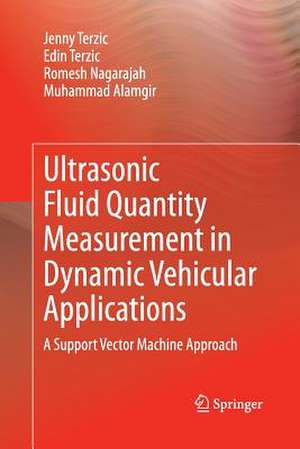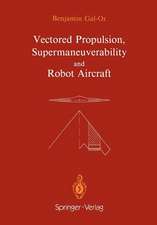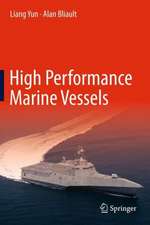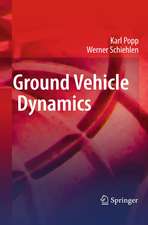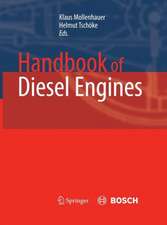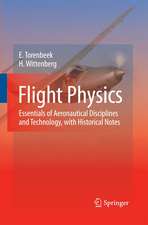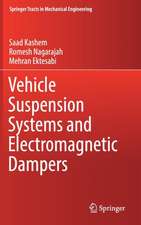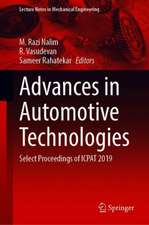Ultrasonic Fluid Quantity Measurement in Dynamic Vehicular Applications: A Support Vector Machine Approach
Autor Jenny Terzic, Edin Terzic, Romesh Nagarajah, Muhammad Alamgiren Limba Engleză Paperback – 7 iul 2015
Ultrasonic Fluid Quantity Measurement in Dynamic Vehicular Applications: A Support Vector Machine Approach describes the research and development of a fluid level measurement system for dynamic environments. The measurement system is based on a single ultrasonic sensor. A Support Vector Machines (SVM) based signal characterization and processing system has been developed to compensate for the effects of slosh and temperature variation in fluid level measurement systems used in dynamic environments including automotive applications. It has been demonstrated that a simple ν-SVM model with Radial Basis Function (RBF) Kernel with the inclusion of a Moving Median filter could be used to achieve the high levels of accuracy required for fluid level measurement in dynamic environments.
Aimed toward graduate and postgraduate students, researchers, and engineers studying applications of artificial intelligence, readers will learn about a measurement system that is based on a single ultrasonic sensor which can achieve the high levels of accuracy required for fluid level measurement in dynamic environments.
| Toate formatele și edițiile | Preț | Express |
|---|---|---|
| Paperback (1) | 633.02 lei 43-57 zile | |
| Springer International Publishing – 7 iul 2015 | 633.02 lei 43-57 zile | |
| Hardback (1) | 637.59 lei 43-57 zile | |
| Springer International Publishing – 28 iun 2013 | 637.59 lei 43-57 zile |
Preț: 633.02 lei
Preț vechi: 744.73 lei
-15% Nou
Puncte Express: 950
Preț estimativ în valută:
121.13€ • 126.81$ • 100.23£
121.13€ • 126.81$ • 100.23£
Carte tipărită la comandă
Livrare economică 07-21 aprilie
Preluare comenzi: 021 569.72.76
Specificații
ISBN-13: 9783319033273
ISBN-10: 3319033271
Pagini: 144
Ilustrații: XIV, 129 p.
Dimensiuni: 155 x 235 x 8 mm
Greutate: 0.21 kg
Ediția:2013
Editura: Springer International Publishing
Colecția Springer
Locul publicării:Cham, Switzerland
ISBN-10: 3319033271
Pagini: 144
Ilustrații: XIV, 129 p.
Dimensiuni: 155 x 235 x 8 mm
Greutate: 0.21 kg
Ediția:2013
Editura: Springer International Publishing
Colecția Springer
Locul publicării:Cham, Switzerland
Public țintă
ResearchCuprins
Introduction.- Ultrasonic Sensing Technology.- Ultrasonic Sensor Based Fluid Level Sensing Using Support Vector Machines.- Methodology and Experimental Program.- Experimentation.- Results.- Discussion.- Conclusion and Future Work.
Notă biografică
Dr. Jenny Terzic is the Director of Corporate Quality at Iveco Trucks Australia (Fiat Group). She holds a Bachelor of Mechanical Engineering (with honors), Master of Engineering in Computer Integrated Manufacturing and PhD in Automotive Engineering from Swinburne University of Technology. She has published a number of technical papers in the area of Engineering Applications of Artificial Intelligence. Areas of research include: support vector machines, artificial neural networks, advance signal processing, intelligent sensors, and noncontact inspection.
Dr. Edin Terzic is the Chief Manufacturing Engineer—Asia Pacific and Managing Director (CEO) of Powertrain at Delphi Automotive Systems Australia. He holds a Bachelor of Mechanical Engineering (with honors), Master of Engineering in Computer Integrated Manufacturing, and PhD in Automotive Engineering from Swinburne University of Technology. He has published a number of technical papers in the area of Engineering Applications of Artificial Intelligence. He also holds several international patents in the area of automotive engineering and had success in commercializing most of his research. Areas of research include: artificial neural networks, intelligent sensors and non-contact inspection.
Prof. Romesh Nagarajah is the Professor of Mechanical Engineering at Swinburne University of Technology. He leads an internationally recognized research group working inthe fields of Non-Contact Inspection and Intelligent Sensing. Professor Nagarajah has several international patents and has published over 150 international journal, conference, and technical papers in intelligent sensing and non-contact inspection. He has received several grants from the Australian Research Council and the automotive industry to develop intelligent sensing systems for process monitoring and non-contact inspection.
Muhammad Alamgir is a Software Engineer at Vipac Engineers and Scientists. He has graduated in Computer Systems Engineering from RMIT University. He has been developing microcontroller-based sensors and instruments, and has also been involved in smart-sensor-based projects, incorporating Artificial Intelligence based techniques, at Delphi Automotive Systems, Australia.
Dr. Edin Terzic is the Chief Manufacturing Engineer—Asia Pacific and Managing Director (CEO) of Powertrain at Delphi Automotive Systems Australia. He holds a Bachelor of Mechanical Engineering (with honors), Master of Engineering in Computer Integrated Manufacturing, and PhD in Automotive Engineering from Swinburne University of Technology. He has published a number of technical papers in the area of Engineering Applications of Artificial Intelligence. He also holds several international patents in the area of automotive engineering and had success in commercializing most of his research. Areas of research include: artificial neural networks, intelligent sensors and non-contact inspection.
Prof. Romesh Nagarajah is the Professor of Mechanical Engineering at Swinburne University of Technology. He leads an internationally recognized research group working inthe fields of Non-Contact Inspection and Intelligent Sensing. Professor Nagarajah has several international patents and has published over 150 international journal, conference, and technical papers in intelligent sensing and non-contact inspection. He has received several grants from the Australian Research Council and the automotive industry to develop intelligent sensing systems for process monitoring and non-contact inspection.
Muhammad Alamgir is a Software Engineer at Vipac Engineers and Scientists. He has graduated in Computer Systems Engineering from RMIT University. He has been developing microcontroller-based sensors and instruments, and has also been involved in smart-sensor-based projects, incorporating Artificial Intelligence based techniques, at Delphi Automotive Systems, Australia.
Textul de pe ultima copertă
Accurate fluid level measurement in dynamic environments can be assessed using a Support Vector Machine (SVM) approach. SVM is a supervised learning model that analyzes and recognizes patterns. It is a signal classification technique which has far greater accuracy than conventional signal averaging methods.
Ultrasonic Fluid Quantity Measurement in Dynamic Vehicular Applications: A Support Vector Machine Approach describes the research and development of a fluid level measurement system for dynamic environments. The measurement system is based on a single ultrasonic sensor. A Support Vector Machines (SVM) based signal characterization and processing system has been developed to compensate for the effects of slosh and temperature variation in fluid level measurement systems used in dynamic environments including automotive applications. It has been demonstrated that a simple ν-SVM model with Radial Basis Function (RBF) Kernel with the inclusion of a Moving Median filter could be used to achieve the high levels of accuracy required for fluid level measurement in dynamic environments.
Aimed toward graduate and postgraduate students, researchers, and engineers studying applications of artificial intelligence, readers will learn about a measurement system that is based on a single ultrasonic sensor which can achieve the high levels of accuracy required for fluid level measurement in dynamic environments.
Ultrasonic Fluid Quantity Measurement in Dynamic Vehicular Applications: A Support Vector Machine Approach describes the research and development of a fluid level measurement system for dynamic environments. The measurement system is based on a single ultrasonic sensor. A Support Vector Machines (SVM) based signal characterization and processing system has been developed to compensate for the effects of slosh and temperature variation in fluid level measurement systems used in dynamic environments including automotive applications. It has been demonstrated that a simple ν-SVM model with Radial Basis Function (RBF) Kernel with the inclusion of a Moving Median filter could be used to achieve the high levels of accuracy required for fluid level measurement in dynamic environments.
Aimed toward graduate and postgraduate students, researchers, and engineers studying applications of artificial intelligence, readers will learn about a measurement system that is based on a single ultrasonic sensor which can achieve the high levels of accuracy required for fluid level measurement in dynamic environments.
Caracteristici
Covers the dynamic aspect (sloshing) of the fluid level measurement system in the vehicle and uses SVM as a method to improve accuracy of the system and recognize the sloshing pattern in the fuel tank with superior accuracy Discusses extensive experimental results based on practical application Includes many illustrations and examples Includes supplementary material: sn.pub/extras
